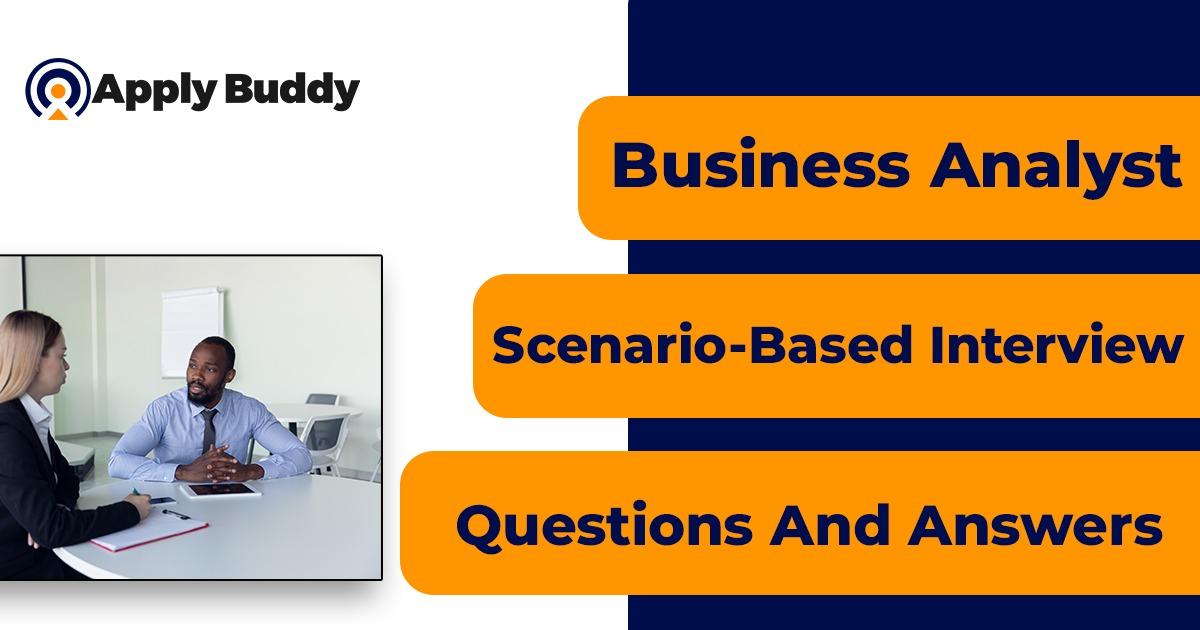Business analyst scenario-based interview questions and answers are designed to test candidates on how they handle real-world situations. These questions assess technical knowledge and crucial soft skills, such as problem-solving abilities, effective communication, and adaptability in dynamic environments.
In this guide, you will learn how to navigate these questions using the STAR method, which provides a structured answer approach. With thorough preparation and practice, candidates can confidently demonstrate their value to prospective employers, showcasing their readiness to tackle challenges and contribute to successful projects within the organisation.
Understanding Scenario-Based Interview Questions
Scenario-based interview questions simulate on-the-job situations that candidates may encounter. These questions require candidates to describe past experiences or hypothesise how to approach a new challenge. For example, a question might ask, “Describe a time when you had to manage conflicting priorities from stakeholders.” The candidate’s response should illustrate their ability to analyse the situation, weigh options, and communicate effectively.
In business analysis, handling complex situations is part of the daily routine. Interviewers use scenario-based questions to assess how candidates approach challenging scenarios, such as managing scope creep, dealing with difficult stakeholders, or navigating shifting project requirements. How a candidate responds provides insights into their interpersonal skills, critical thinking, and ability to adapt.
The best way to approach these questions is by breaking down your response using the STAR method. This structure ensures that candidates provide a comprehensive answer highlighting relevant skills and experiences. Candidates should focus on delivering concise, honest answers that directly address the scenario.
Read also: How to Talk About Your Skills in an Interview

Key Skills Evaluated in Scenario Questions
Scenario questions primarily evaluate four essential business analyst competencies, which we will assess below:
- Analytical Thinking: Ability to break down complex problems and devise actionable solutions.
- Communication: Skill in translating technical information into a language accessible to stakeholders of varying levels.
- Problem-solving: Capability to identify challenges and determine practical ways to resolve them.
- Interpersonal Skills: Experience managing relationships, particularly when resolving conflicts or securing buy-in for project objectives.
Example:
A question might be, “How do you handle a situation where stakeholders disagree on project priorities?” An ideal answer would outline how the candidate clarifies each stakeholder’s priorities, mediates the discussion, and finds a compromise that aligns with the project’s overall goals.
How Scenario Questions Are Structured
Scenario-based questions are targeted at assessing your ability to handle issues practically. They generally follow one of two formats:
- Behavioural Questions: These are past-oriented and ask about specific experiences. Example: “Tell me about a time when you had to deal with an unexpected change in project scope.”
- Hypothetical Questions: These are future-oriented and ask how the candidate would handle a situation. Example: “How would you approach a project with a significantly shortened timeline?”
There are several common types of scenario questions to assess your specific skills, including:
- Problem Solving: How a candidate approaches and resolves issues, such as “Describe a time when you faced a major project challenge and how you resolved it.”
- Conflict Resolution: These questions assess how a candidate handles interpersonal conflicts, for example, “How do you deal with stakeholders who disagree on project requirements?”
- Requirements Gathering: These questions test a candidate’s ability to elicit and document requirements. For example, “Describe your process for gathering requirements from multiple departments with conflicting needs.”
- Adaptability: These questions explore how well a candidate adjusts to change. Example: “Tell me about a time when project requirements changed suddenly. How did you handle it?”
Read also: How to Overcome Interview Anxiety and Project Confidence

Common Scenario-Based Interview Questions for Business Analysts
Scenario-based interview questions are crucial for evaluating a business analyst’s problem-solving and communication skills. By understanding these scenarios, you can prepare effective responses that showcase your experience and capability, ensuring you make a strong impression during your interview.
Questions About Requirements Gathering
For example, a question might ask: “How do you handle a situation where stakeholders have vague requirements?”
In this case, candidates should discuss clarifying requirements by conducting interviews, workshops, or other elicitation techniques to ensure the project’s needs are clearly defined.
Additional Sample Question:
– “What steps do you take if stakeholders are unclear on their needs during the requirements gathering phase?”
An answer might involve the candidate explaining how they facilitate sessions to help stakeholders articulate their needs, prioritise requirements, and resolve ambiguities.
Questions About Problem Solving and Conflict Resolution
For example, an interviewer might ask: “Describe a situation where you had to mediate a conflict between two team members.”
Here, candidates should discuss their approach to active listening, empathy, and finding a solution that meets the interests of both parties. Specific examples of resolving a past conflict can illustrate their conflict resolution skills.
Additional Sample Question:
“What would you do if a team member disagreed with your project risk analysis?”
An effective answer might detail the candidate’s approach to understanding the team member’s perspective, reassessing the analysis, and working towards a mutual understanding or compromise.
How to Answer Scenario-Based Business Analyst Interview Questions
When answering scenario-based business analyst interview questions, use the STAR method to structure your responses. Begin by describing the situation, then outline the Task, explain the Action you took, and conclude with the Result. This approach helps provide a clear, concise, and impactful answer.
Emphasise your problem-solving abilities, adaptability, and communication skills throughout your response, and tailor your examples to highlight relevant experiences. By preparing with everyday scenarios and practising structured responses, you can effectively convey your expertise and increase your chances of interview success.
Using the STAR Method to Frame Answers
The STAR method provides a clear framework for candidates to showcase their experience in a structured way. When answering questions, candidates should:
- Situation: Briefly describe the context or background.
- Task: Explain the specific challenge or responsibility.
- Action: Outline the steps taken to address the issue.
- Result: Share the outcome, emphasising any positive results or lessons learned.
Example Using STAR:
Question: “Describe a time when you had to adapt to significant changes in project requirements.”
Answer:
- Situation: “In a recent project, our client decided to change the scope halfway through development due to new market trends.”
- Task: “I was responsible for ensuring that the team adjusted to the new requirements without delaying the timeline.”
- Action: “I conducted a risk assessment, worked with the team to re-prioritize tasks, and communicated new deadlines with the client.”
- Result: “We successfully delivered the revised project on time, which led to further business opportunities with the client.”
Read also: How to Send a Thank You Note That Leaves a Lasting Impression

Unlock your dream job with Apply Buddy!
Whether you’re targeting the NHS, civil service, or any industry, we make your job search stress-free and effective.
Our expert team streamlines your job applications, optimises your CV and LinkedIn profile, and prepares you for interviews.
Practising with Sample Scenario Questions
Regular practice enables candidates to refine their answers and boost their confidence significantly. Engaging with diverse scenarios prepares them to think critically and adapt quickly, allowing for effective responses to unexpected questions. This preparation enhances their communication skills and helps them articulate their thought processes clearly during interviews, making a lasting impression on potential employers.
Sample Business Analyst Scenario-Based Interview Questions and Answers
Reviewing these business analyst interview answer examples and scenario question samples, you’ll learn how to effectively tackle real-world challenges, highlight your problem-solving skills, and demonstrate your value to potential employers.
Sample Question 1: Describe a situation where you had to gather requirements from a difficult stakeholder.
Answer:
- Situation: “During a project to upgrade an internal CRM system, I encountered a key stakeholder who was uncooperative and resistant to change.”
- Task: “I needed to gather accurate requirements from them to ensure the upgrade would meet the department’s needs.”
- Action: “I set up a meeting to understand their concerns, framed my questions to focus on their pain points, and built rapport by aligning the project benefits with their objectives.”
- Result: “They eventually opened up, and I was able to gather essential requirements that led to a successful CRM upgrade.”
Sample Question 2: How would you handle a situation where project requirements change frequently?
Answer:
- Situation: “In a project with a rapidly evolving scope, I found that requirements changed frequently as new business needs emerged.”
- Task: “I had to manage these changes without impacting the project’s delivery timeline and budget.”
- Action: “I introduced a change management process, documented each change request, communicated the implications to all stakeholders, and adjusted timelines as needed.”
- Result: “The structured approach allowed us to accommodate changes while meeting the final delivery deadline, which impressed the client.”
FAQs: Business Analyst Scenario-Based Interview Questions and Answers
1. What are scenario-based interview questions for business analysts?
Scenario-based interview questions for business analysts assess their ability to handle real-world situations, focusing on problem-solving, communication, and adaptability. These questions explore how candidates respond to challenges, manage conflicts, and meet project requirements effectively.
2. How do I prepare for scenario-based business analyst interviews?
To prepare for scenario-based business analyst interviews, practice using the STAR method to structure responses, review common scenarios, and highlight relevant skills. Focus on showcasing problem-solving, adaptability, and communication abilities through specific examples from past experiences.
3. What skills do scenario-based questions assess in business analysts?
Scenario-based questions assess business analysts’ skills in problem-solving, critical thinking, communication, and interpersonal relations. They evaluate the ability to navigate challenges, manage conflicts, gather requirements, and adapt to changing project dynamics effectively within real-world contexts.
4. How can I effectively answer scenario-based questions in an interview?
To effectively answer scenario-based questions, use the STAR method—describe the Situation, Task, Action, and Result. Focus on showcasing problem-solving skills, adaptability, and relevant experiences while providing specific examples demonstrating your ability to handle similar challenges.





